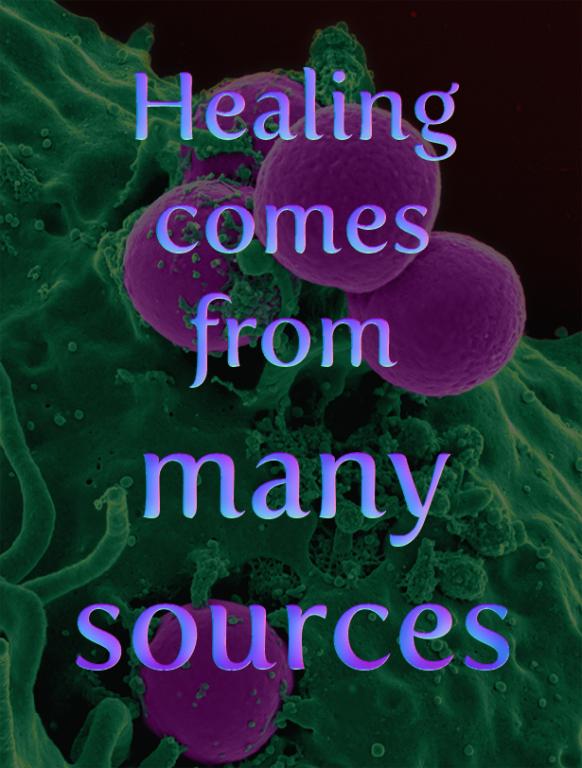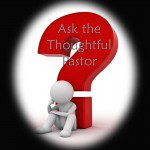We who call ourselves followers of Jesus carry the expectations that we will also heal, bring good news to the poor, offer release to the captives, give recovery of sight to the blind, and free the oppressed.
 Dear Thoughtful Pastor: Last week, a Bible literalist church pastor was arrested in the death of his 2-year-old grandchild. The parents, members of the church, refused any medical intervention and she died of pneumonia. Antibiotics would have easily cured her.
Dear Thoughtful Pastor: Last week, a Bible literalist church pastor was arrested in the death of his 2-year-old grandchild. The parents, members of the church, refused any medical intervention and she died of pneumonia. Antibiotics would have easily cured her.
Why refuse standard medical treatment? They were taught to put all their faith in God and shun doctors. If God wanted to save her, He would. If He didn’t, it was His will that she die.
Is this pastor correct? Is modern medicine, which offers so much hope for the relief of suffering and prolonging life, our Tower of Babel, our attempt to thwart God’s Will?
I know this is a difficult subject to explore. We seem to be in a transition between a worldview in which almost everything was a mystery and God’s handiwork was all around us to a worldview where natural laws prevail, and we just need to discover those laws to bend them to our will. In the process, it appears God gets slowly squeezed out of our daily lives.
After research, I discovered that more than 25 children from this particular and very secretive Pennsylvania congregation pastored by this man have died in the past 35 years. I assume a fair number of adults have also seen earlier deaths than would be expected with modern medical care.
And yes, the answer is, “If God wanted to save her, God could.” But I ask, and I think you also ask, “If God wanted to save her, could God gave people the brains and the creative impulses that lead to modern medicines like antibiotics?”
My own medical miracle
Laser surgery to correct vision is now relatively common. But before this technology came along, a courageous and talented ophthalmologist took a knife to my eyes. He changed my eyesight from near legal blindness to something closely approaching 20/20.
I declared it a miracle, giving credit both to God and to this doctor. “If God wanted to fix my near-blindness, God could . . . and did.”
When Jesus made his entrance into public life, he went to the synagogue in Nazareth, his hometown. Jesus stood up and was handed a scroll from the prophetic book of Isaiah.
He read, “The Spirit of the Lord is upon me because he has anointed me to bring good news to the poor. He has sent me to proclaim release to the captives and recovery of sight to the blind, to let the oppressed go free, to proclaim the year of the Lord’s favor.”
Afterward, he said, “Today this scripture has been fulfilled in your hearing.” Then he went forth to do those very things.
We, too, are called to heal
A few hours before his death, Jesus announced to his disciples, “Very truly, I tell you, the one who believes in me will also do the works that I do and, in fact, will do greater works than these, because I am going to the Father.”
We who call ourselves followers of Jesus carry the expectations that we will also heal, bring good news to the poor, offer release to the captives, give recovery of sight to the blind, and free the oppressed.
The question then becomes: can we see the fullness of God when we do any of these things even when the means is different from that which Jesus used?
In other words, if we bring good news to the poor by the electronic transfer of funds, for example, a GoFundMe project, is God as present in that act as we would more readily see the presence of God in personally paying off someone’s debt?
If indeed, we can say “yes” to that, then it seems we can also make a move to acknowledging the presence of God in the giving of antibiotics, antiseptic operating rooms and laser technologies.
We as a society have gone too far in separating the sacred from the secular. What happens in worship in so-called “sacred” spots should be tightly integrated with what happens on Monday mornings at work and during Saturday night entertainment. By disengaging these activities, we lose the mystery of an existence informed and suffused by the Holy Presence.
The loss of mystery, of active acknowledgment of the unseen, diminishes the human soul. Instead of being routinely confronted with the sense of unknowing, we think we can indeed know, and thus control, all.
But should we know all, and indeed should we control all, then we become God. Thus we return to the greatest of all temptations. We begin to believe that we are God.
When we lose mystery, we also lose humility.
When we lose humility, we lose our souls.
I’m sympathetic to the pastor’s stance: “If God wanted to, God could.” I think God wants to, and God has. But too many choose to reject what God has done.
 [Note: A version of this column is slated to run in the March 24, 2017, edition of the Denton Record-Chronicle. The Thoughtful Pastor, AKA Christy Thomas, welcomes all questions for the column. Although the questioner will not be identified, I do need a name and verifiable contact information in case the newspaper editor has need of it. You may use this link to email questions.]
[Note: A version of this column is slated to run in the March 24, 2017, edition of the Denton Record-Chronicle. The Thoughtful Pastor, AKA Christy Thomas, welcomes all questions for the column. Although the questioner will not be identified, I do need a name and verifiable contact information in case the newspaper editor has need of it. You may use this link to email questions.]













